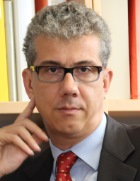Visiting Professor: Andrea Bianchi
 Professor Andrea Bianchi (Professor of International Law, The Graduate Institute, Geneva) has recently joined The Dickson Poon School of Law as Visiting Professor. Here he talks about what drew him to the Law School and his plans while he is here.
Professor Andrea Bianchi (Professor of International Law, The Graduate Institute, Geneva) has recently joined The Dickson Poon School of Law as Visiting Professor. Here he talks about what drew him to the Law School and his plans while he is here.
Professor Bianchi, welcome to King’s and to The Dickson Poon School of Law. What made you choose King’s?
I am absolutely delighted to be here. The Dickson Poon School of Law, King's College London is a top-notch law school and a vibrant intellectual community. There are many colleagues whom I hold in great esteem, and I believe it is just the place I needed for my sabbatical. As to my plans, I am finishing up a book on international legal theories, which is an inquiry into the different ways in which one can think about international law. Looking at international law through the lens of Law & Economics, Social Idealism, Marxism or any of the other fourteen approaches I have selected in the book, makes you see a dramatically different reality! At the same time, I am still doing research and writing on counterterrorism and international law, a topic that I have been dealing with in the past few years. Doing academic research and writing is always a difficult exercise. One needs intellectual stimulus and a pleasant working environment. I am grateful to King’s to have provided both.
You will be teaching some of our students while you are here. Are there any differences between the way students here are taught and learn from their lecturers compared to your home institution?
Not really. Both King’s and the Graduate Institute have a very international students body. Students are eager to learn and need to believe that what they learn is important, not necessarily in terms of an immediate practical utility. Most of the students I see are guided in their learning process by a genuine desire to make a difference in society. As law is an important social process, students should be made aware of the particular responsibility that the practice of law entails vis-à-vis the community. Yet another common trait one I have noticed among students in both institutions is their intellectual curiosity. If you spur their curiosity they are very responsive. It is a commonplace to associate law with rigidity and narrow-mindedness. It is not necessary for lawyers to have ‘a stunningly selective sense of curiosity’, as Pierre Schlag once said. Rather to the contrary, good lawyers are imaginative and sensitive people who take seriously what they do, and who are perfectly aware of their professional responsibility.
You will be in conversation with the Dean later in the year as part of our public event series. What kinds of discussion do you hope to have as part of the event?
I like the idea of conversing with the Dean. Conversation is a spontaneous form of communication, very rarely performed in an academic setting. There is no script, and one can build on what the other says. Conversation often allows discovering people beyond their professional profile, as individuals with their own style, emotions, and personal history. I definitely like it as a format. Furthermore, as Dean Caron and I are both international lawyers I expect the conversation to bear upon matters of international law and governance. It is always fascinating to converse about international law. Such questions as what international law is for, and how it can be ameliorated to better serve the interests of the people are questions that are still worth being asked. Some people see international law as an emancipatory project to enhance the well being of humankind. Some others look at it as if it were some sort of evil design deployed by powerful States, as if it were the cause of rather than the solution to the world’s problems. The pendulum constantly swings between hope and despair, between a sense of fulfilment and a sense of lacking. International law in and of itself could be described as a particular discourse, or form of conversation used in international relations. So I very much look forward to having a conversation with the Dean about this particular form of conversation!
Visit Professor Andrea Bianchi’s staff profile on our website.